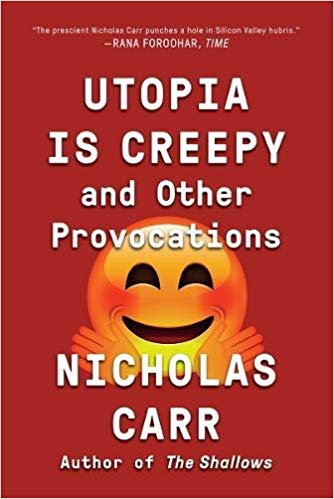Utopia Is Creepy: And Other Provocations
by Nicholas Carr.
W. W. Norton & Company, Inc., 2016.
Hardcover, 360 pages, $15.
Reviewed by Jacob Bruggeman
Historians and science fiction writers, philosophers and some politicians, have for decades warned us of the roots-deep danger in dreamlands. In Utopia Is Creepy, Nicholas Carr takes on the same role, cautioning us against what is simultaneously the most energizing and elusive of human aspirations: Utopia.
Today, as always, many aspire to utopia on Earth. Inspired by gurus speaking of “we’re all one” spiritual Shangri-Las, Silicon Valley startups and giants alike seeking techno-utopia on Earth, and academicians’ societal designs for an injustice-free social order, there’s no shortage of prophets for human paradise. In this book, Carr has collected over a decade of his writings on such schemes, thoughts on some of the not-so-great developments in the modern world, and reflections on some of the things we may have lost along the long road from past to present.
Carr’s collection of essays is humorous, his style at times even lighthearted, but in the closing paragraphs of each essay his prose gets heavy, his words cut through the haze that often hides and obscures the realities of progress in our world, and his prognoses for society are anything but comfortable, all-assured assessments of an everlasting, prosperous, technology-driven humanity. Our future—utopia or not—might have us all singing along with Radiohead: “What the hell am I doing here? I don’t belong here.” Speculating as much, Carr refuses to blindly celebrate our age and its countless offerings, instead erring on the side of caution. Carr thus represents an interesting and increasingly popular brand of the reactionary stance. He loves what is beautiful, good, and true about our past and human nature, and he makes a great effort to pump the brakes on our collective erasure of, or failure to recall, those things. Yet, like many others concerned with the preservation of permanent things, myself included, Carr cannot help smiling in the sunset, joking about the mast as the ship sinks.
To be clear, the ship has not yet sunk. That’s why Carr’s collection of essays is valuable; let’s look at a few from the book. In “Big Trouble in Second Life,” Carr tells us of a software program called CopyBot, essentially this virtual world’s Star Trek Replicator. CopyBot allowed residents of this virtual world to make perfect replicas of any residents’ creation, including other residents themselves, thus raising “a struggle over the identity, the very essence, of the virtual land.” In another essay, “Memory Is the Gravity of Mind,” Carr tackles the importance and meaning of the fact that, in the modern age, “processes of human memory are adapting to the advent of new computing and communication technology,” and the more and more evident reality that “we are becoming symbiotic with our computer tools.”
What happens, Carr calls upon his readers to ask themselves, when knowledge and memories shift “from the individual mind to the machine’s shared database”? Carr is concerned about what the answer to that question might be. “The Shortest Conversation Between Two Points,” published in 2013, deals with the lack of courtesy in modern and machine communication. Carr worries that our increasing dependence on all things digital will lead to, as Adorno said, “an ideology for treating people as things.”
Toward the end of the book, Carr’s essay “The Daedalus Mission” tackles the timeworn troubles that come with, well, being a mortal human being, and society’s rising efforts to surmount the limitations. From brain implants and “centimeter-sized neural ‘modems’” that the military’s DARPA is designing to “facilitate the formation of new memories and retrieval of existing ones” and allow for “high-speed, standardized data transmissions between brains and computers,” to the Transhumanists like Oxford’s Nick Bostrom, who argue that we ought to “use technological means that will eventually enable us to move beyond what some would think of as ‘human,’” it is clear that aspirations for this techno-utopia are everywhere in our society. The twenty-first century showed us that socialist utopia is suicide; Carr demonstrates that techno-utopia would, at the very least, be creepy and, at worst, destructive of all things human.
Jacob Bruggeman is an honors student in his third year at Miami University with majors in history and political science, and a combined BA–MA program in political science. Jacob was recently honored for his research as one of fifteen national recipients of the Gilder Lehrman History Scholar award, and is one of two Joanna Jackson Goldman Scholars at Miami. In 2017, Jacob founded The New Herald, a journal of cultural and political commentary.
